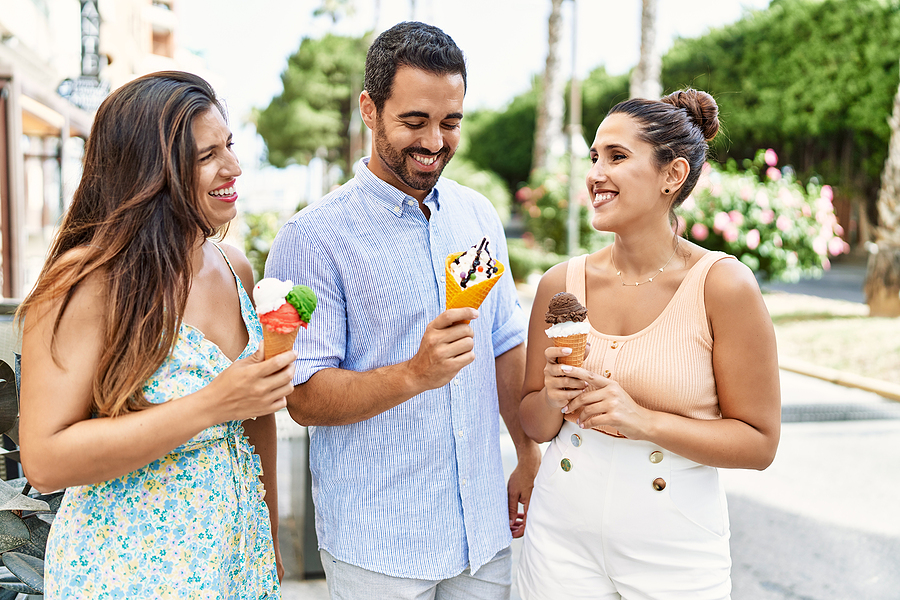
Growing up, my identity was bound together with being an athlete. I played three sports, and it was a rare day when I didn’t have practice, a game, or training session on the calendar.
Being so active, I never worried about what I ate. My family didn’t cook many vegetables or clean meals. We often ate hearty, delicious, cheesy Midwest casseroles, boxed cookies, and processed snacks. This was normal for me. When I was hungry, I eagerly ate pizza, donuts, pasta, burritos, or whatever was in front of me without a second thought.
When I went to college, however, my mindset towards food sharply changed. I was no longer a student athlete, and I was beginning to learn about wellness. My freshman year, we were required to take a class on nutrition. I remember our professor taking a cup of Sprite, my favorite pop, and showing us the amount of sugar that was in it by comparing it to a cup of pure sugar. I was stunned. I realized the majority of what I ate and drank in a day was filled with more sugar than the recommended amount for someone my age. For the first time, I realized my eating habits needed to change.
Instead of taking an incremental approach, I cut out virtually all sugar and carbs from my diet after that class. At friends’ birthday parties, I would say no to cake and ice cream. After a night out, I would go straight to bed instead of joining my roommates for late-night pizza.
Though these habits were good for my physical health, slowly, they began to weigh on my mental health. What started as restricting most sweets evolved into weighing myself three to four times a day. Despite being at a healthy weight, I obsessively tracked calories and refrained from keeping snacks in my room so I wouldn’t eat between meals.
A year or two into college, I found myself consumed by constant thoughts about food: What did I eat so far that day? How much do I need to work out to burn it off? Why did I eat that? On the outside, I was physically fit, but on the inside, I was anxious about maintaining this state of perfection with food. Watching my friends enjoy the occasional doughnut or slice of pizza became stressful for me.
RELATED: Loving the Shape I’m In
I never considered talking to a nutritionist or seeking out professional health. Instead, I thought that this was “normal” behavior, and tried to tell myself I was eating healthy. I spent most of my sophomore and junior year this way.
During my senior year, I briefly integrated sugar back into my diet. I felt I had been healthy enough for so long and had earned it. Just as I had with cutting it out, I didn’t know how to create a healthy balance: I snowballed and overindulged. Some nights, I had a whole pint of Ben and Jerry’s. Feeling guilt the next day, I’d barely eat anything at all, in an attempt to balance out my calories.
When I went home for winter break, my family commented on my weight loss: “You’re so skinny!” These comments proved confusing: I felt both affirmed and discouraged. My parents noticed my habit of checking labels obsessively. I didn’t notice I had a problem until they said, “Allie, do you really need to worry about the calories in that?”
Although I heard their concern, it wasn’t until I graduated and started a new job that I began to critically reflect on my obsession with food. I realized the sense of control my rigidity brought me was actually doing the opposite: In placing so much emphasis on my relationship with food, I felt out of control. How could I shift to a balance of healthy eating with the occasional indulgence? At the time, it seemed impossible.
Slowly, though, I learned that the world would not end if I eat some gelato or drink a glass of wine. I began following more holistic eating accounts on Instagram, for instance, that filled my timeline with ways to indulge smartly instead of encouraging calorie restriction. I also began to read more about intuitive eating and listen to podcasts on nutrition and fitness.
Giving myself permission to enjoy the pleasure of some of my favorite treats felt like granting myself back the freedom I took away. This was not always easy. Some weeks, I would find myself indulging like a high school athlete again. Eating and drinking some of my favorite snacks made me feel like I was treating myself, which felt freeing and nostalgic.
However, with practice, I’ve learned how to maintain a balance of fitness and nutrition in order to feel like my best self. I did more research and learned how to cook healthy meals for myself, but also how to bake some of my favorite sweets and desserts. My approach now is simple: I listen to my body and eat when I’m hungry, filling my plate with the foods I love and will nourish my body.
At my core, I believe letting myself enjoy small pleasures is what makes me feel more human and alive. I am telling myself, “You will be okay if you enjoy this cookie” instead of, “You are breaking the rules if you enjoy this cookie.” This gentler, more positive language I am practicing with myself has let me be more relaxed at social events and more forgiving of myself when I do have the occasional overindulgence.
In the end, I’m not willing to go back to cutting out any type of food cold turkey. For me, this balance is crucial to living a fulfilling, satisfying life.